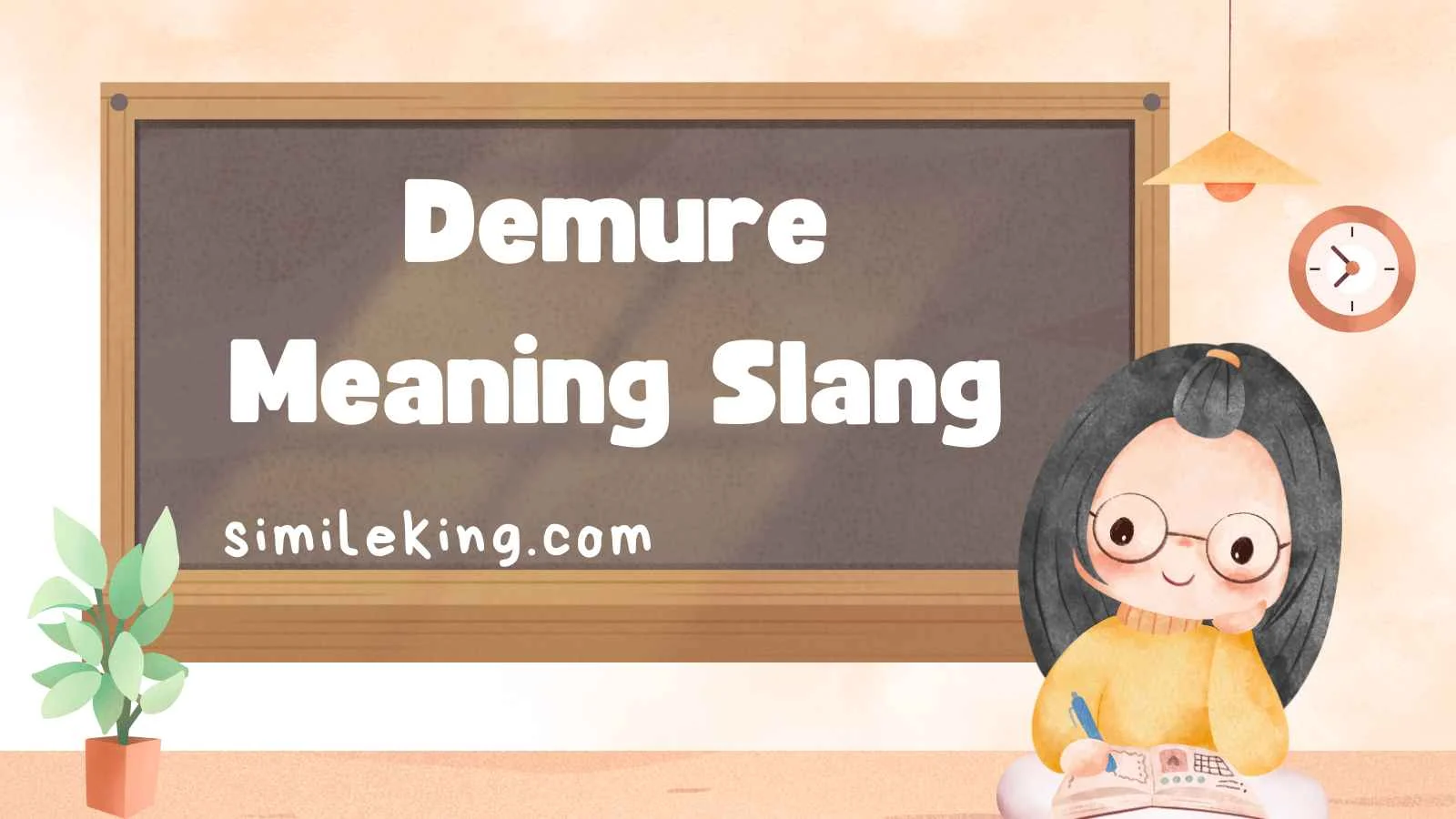Language evolves constantly, and few words illustrate this as well as demure. Traditionally, “demure” has meant reserved, modest, or shy, often applied—sometimes unfairly—to women. But in 2025, its slang usage has shifted dramatically, and its connotations vary depending on tone, context, and generation.
This article explores what demure means in slang today, its formal definition, its cultural and conversational nuances, and how you can use alternatives that feel polite, professional, or casual. Whether you’re decoding a text message, writing creatively, or trying to sound natural in conversation, you’ll find insights here that no other article covers.
What Does “Demure” Mean in 2025?
In standard English, “demure” describes someone who is modest, reserved, or quietly composed. A “demure smile” suggests restraint rather than boldness.
But in modern slang, demure has broadened:
- Among Gen Z and Gen Alpha, it sometimes implies “playing it cool” or acting understated on purpose.
- In online culture, “demure” can describe someone who is low-key attractive, effortlessly elegant, or mysterious.
- In texting shorthand, it occasionally carries an ironic twist—as in someone calling themselves “demure” when they’re being the opposite.
For example:
- “She walked into the party looking all demure, but everyone knew she was the main event.”
- “He gave a demure little response, like he didn’t know he just went viral.”
This new slang layer of demure goes beyond shyness; it now connects with aesthetic, social performance, and subtle power.
Why Context Matters with “Demure”
Unlike slang terms that have a fixed meaning, demure is flexible. Its tone shifts depending on how you use it:
- Polite/Formal: Suggests elegance and modesty. (“Her demure presentation style won the committee’s respect.”)
- Casual/Slang: Suggests understated coolness or quiet confidence. (“That outfit is so demure, but it slays.”)
- Ironic/Playful: Used sarcastically to highlight the opposite. (“Sure, that was demure of you—posting 10 selfies in one night.”)
This versatility makes it powerful but also easy to misinterpret, especially in professional contexts.
Demure in Text and Digital Culture
Since 2023, words like “demure,” “feral,” and “delulu” have been repurposed in online slang. By 2025, demure often shows up in TikTok captions, Twitter commentary, and aesthetic-driven posts.
- On Instagram: “Demure” is used to describe a soft, minimalist vibe—quiet outfits, muted tones, or graceful poses.
- On TikTok: It’s sometimes used ironically to describe over-the-top behavior (“Me pretending to be demure after downing three energy drinks”).
- In texting: It works as shorthand for being low-key or subtly attractive.
This digital spread means younger users see demure not as old-fashioned, but as revived slang with layers of meaning.
Formal Alternatives to “Demure”
If you’re writing in a professional or polite setting, you may want alternatives that convey the essence of demure without sounding slangy. These work well in essays, reports, or respectful conversations:
- Modest – highlights humility without flashiness.
- Reserved – emphasizes self-restraint and composure.
- Composed – suggests balance and grace.
- Unassuming – stresses quiet confidence.
- Discreet – suggests elegance in not drawing attention.
Example:
Instead of writing “She remained demure during the discussion,” you might say “She remained composed and thoughtful throughout the discussion.”
Casual Alternatives to “Demure”
In everyday speech or texting, you may want softer, more casual replacements that still capture the vibe:
- Low-key – relaxed, subtle.
- Chill – calm and understated.
- Soft – gentle or delicate in style/personality.
- Cool-headed – staying calm without dramatics.
- Understated – stylish without being loud.
Example:
“That outfit is demure but stunning” → “That outfit is low-key gorgeous.”
Playful & Ironic Alternatives
Sometimes, demure is used playfully or sarcastically. Here are phrases that capture the same irony:
- So innocent (not really)
- Angel vibes
- Fake modesty
- Quiet but deadly
- Unbothered queen
Example:
“Posting 20 selfies? Very demure of you.” → “Posting 20 selfies? Such fake modesty.”
How to Choose the Right Alternative
The key is to match tone with context:
- Workplace email: Avoid slang—choose “reserved,” “modest,” or “composed.”
- Creative writing: Use “demure” for subtle elegance, but swap to “unassuming” or “understated” if you want modern clarity.
- Texting with friends: Go with “low-key,” “soft,” or “chill” for natural slang flow.
- Playful banter: Lean into irony—“innocent,” “quiet but deadly,” or “angel vibes.”
This flexibility makes demure one of the few words that can live in both highly formal contexts and Gen Z slang culture without losing relevance.
10 Modern Examples of “Demure” in Use
Here are fresh, 2025-friendly examples to show how demure (and its alternatives) appear across settings:
- Professional: “Her demure leadership style inspired trust without dominating the room.”
- Polite compliment: “That dress is so demure—it’s graceful and elegant.”
- Casual: “She kept it demure with natural makeup, but it still looked amazing.”
- Flirty: “Don’t act so demure—I saw the way you looked at me.”
- Ironic: “Demure of me to stay home after saying I needed rest and then binge-watching all night.”
- Texting (casual): “Your vibe is very demure today—chill but cute.”
- Social media aesthetic: “Cottage-core but make it demure 🌿✨.”
- Sarcastic banter: “Wow, eating a whole pizza by yourself? Demure queen behavior.”
- Poetic: “Her laughter was demure, like light spilling through curtains at dawn.”
- Pop culture reference: “Zendaya can make even a demure outfit look like runway magic.”
Why “Demure” Still Matters in 2025
Unlike trendy slang that fades quickly, demure has longevity. Why? Because it bridges traditional English and modern reinterpretation. It’s:
- Versatile (works in formal and informal contexts).
- Aesthetic-driven (fits fashion, art, and lifestyle talk).
- Ironic-friendly (Gen Z loves flipping meanings).
This makes it a timeless yet fresh word, likely to stick around in 2025 and beyond.
Final Thoughts
“Demure” is a fascinating word: once seen as old-fashioned, it’s now enjoying a slang revival that blends elegance with irony. In 2025, its meaning is no longer limited to shy or modest—it’s about low-key power, effortless style, and playful understatement.
By understanding the context, tone, and alternatives, you can use demure (or swap it for something more precise) in ways that fit any situation—professional, casual, or playful.
Mastering words like this isn’t just about vocabulary—it’s about reading the cultural moment and using language to connect more effectively in conversation, writing, and digital spaces.





